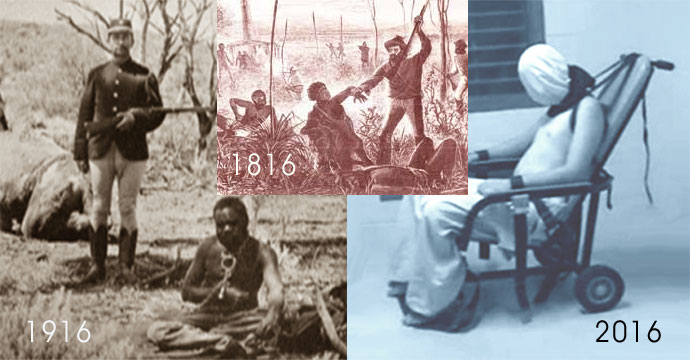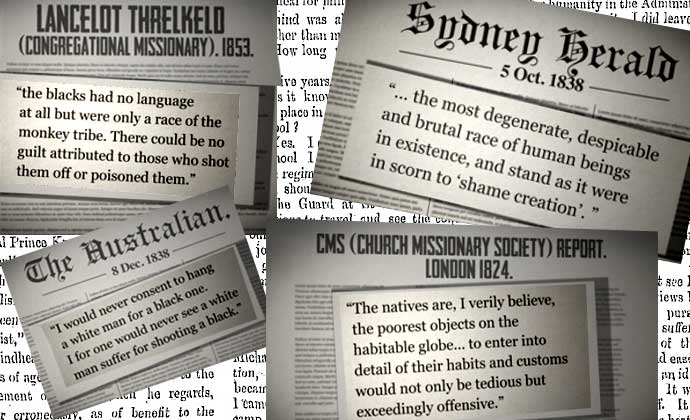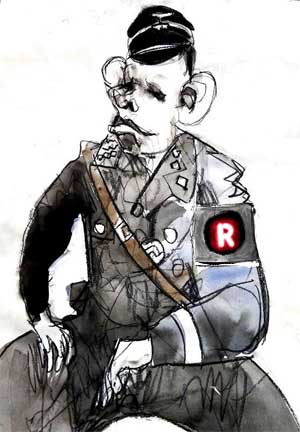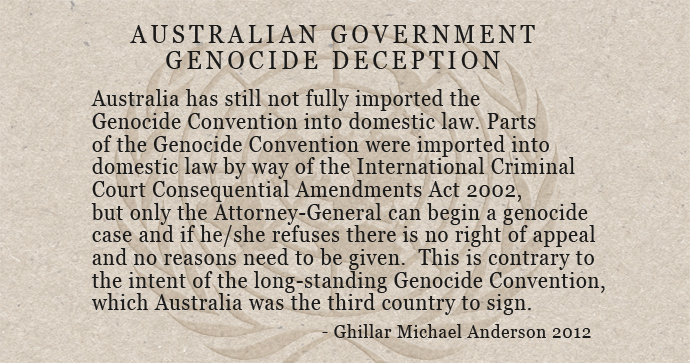No law against genocide means Australia is not a civilised nation
Parts of the Genocide Convention were imported into domestic law by way of the International Criminal Court Consequential Amendments Act 2002, but only the Attorney-General can begin a genocide case and if he/she refuses there is no right of appeal and no reasons need to be given. (268.121 - 268.122). This is contrary to the intent of the long-standing Genocide Convention, which Australia was the third country to sign.
We have requested that the UN Human Rights Commission strongly recommends that the Australian government imports fully the Genocide Convention into domestic law.

25 June 2012
On 18th December 1998 in the ACT Supreme Court, Justice Crispin delivered his judgement on the Aboriginal genocide case, accusing Howard, Fischer, Harradine, Hansen and other Federal Parliamentarians of pre-meditated genocide.
In response to the application by Wadjularbinna Nulyarimma, prosecutors and intervenors Justice Crispin has accepted at law that the atrocities perpetuated against Aboriginal peoples since 1788, and that continue to this day, are in fact genocide:
There is ample evidence to satisfy me that acts of genocide were committed during the colonisation of Australia. (para 78)
It is clear from the bloody pages of Australian history that the wholesale destruction of Aboriginal peoples was related to an equally wholesale usurpation of their lands. Yet, in the light of what we now know it now appears that this course was contrary even to English law.(para 32)
However, Justice Crispin held that the crime of genocide is not punishable under Australian law because he says:
It is clear that whilst the Act effectively ratifies the Convention it does not purport to incorporate the provisions of the Convention into Australian municipal law.(para 66)
I have concluded that no offence of genocide is known to the domestic law of Australia. (para 73)
Ghillar Michael Anderson from Sovereign Union says, "This is contrary to the fact that the majority of High Court judges in the Teoh immigration case, (Minister of state for Immigration and Ethnic Affairs v Ah Hin Teoh (1995) 183 CLR 273;) says that international law, if it is universally accepted, can influence the development of common law in this country."
Australia signed the Genocide Convention with no reservations and in 1949 the Attorney-General's department clearly articulated that Australia had most of the necessary domestic law in place:
... existing law within the Commonwealth provides effective penalties for the majority of the acts described in the Convention as genocide, although it may become necessary to clarify the law in certain respects to provided specifically for the several matters dealt with in the Convention.
"Additionally, in 1950, Australia objected vehemently to the Philippines' reservations to the ratification of the convention against the prevention and punishment of the crime of genocide, when the Philippines attempted to argue that Heads of Government in their country were not liable to be prosecuted.
"From Crispin's judgement it is evident that the pseudo-legal system of Australia works arm in arm with the Australian political system.
"It must be of great concern to Australian political leaders to now observe the Pinochet matter currently in the international arena, where the immunity from prosecution of heads of government is under challenge."

Anderson argues, "How can anyone not classify the policy of 'mainstreaming' as pre-meditated genocide with intent to destroy the group in whole or in part, when it is a continuation of the policy of assimilation, which is based on the science of eugenics, as discussed openly in the NSW Parliament in 1943 by Bruxner:
Dr. Lethbridge ... carries out thousands of blood tests. ... From a blood viewpoint there is nothing to fear from the Aborigine. It is a characteristic of this race that, unlike the negro race, it can be absorbed into the white community without danger.
"It is quite evident that the courts here in Australia fail in their utmost to admit that the minutes of the Aboriginal Welfare Conference, with respect to assimilation policies, constitute a clear intent to commit genocide.

"On 12 July 1967 in Darwin a final policy of assimilation was determined through an 11 point strategy. These policy makers had already decided to isolate the remaining 'fullblood' populations, without social security, so they would ultimately starve and die out:
Ordinarily the Commonwealth Government does not grant Old Age, Invalid, or Widows' Pensions and Maternity Allowances to aboriginals possessing a preponderance of aboriginal blood. Similarly, an aboriginal who resides on a Reserve in NSW is not eligible to receive the Old Age, Invalid, or Widows' Pensions. (Dir. NT Affairs, 15 Jun 1950)
"A digression made from this policy was to have Jeremy Long go into the Great Sandy Desert, Tanami and Gibson Deserts to round up the 'last of the nomads' and bring them into government settlements, in order for the British and Australian governments to conduct their guidance missile testing programmes. It is reported that 60% of the population rounded up at that time and brought to Papunya and Yuendumu died of starvation. Of the first one thousand live births at these centres, 600 died soon after birth.
"These policies have a clear intent of genocide. "
Anderson argues, "No policy which removes you from your spiritual connection, your ancestry, your culture, your religion, your language can in any way be argued as being in your "best interest".
"The central issue of the Genocide Case is that this intent to commit genocide continues into the present and is integral to the Native Title Act as amended.

"In his book Aboriginal Autonomy HC Coombs articulated the 1993 Act in the following terms:
What was granted by the Keating Labor Government was that the legislative largesse is an Aboriginal Native Title engineered to suit white proprietary interests. One has to ask then, is not the survival of Native Title in its legislative form simply another mechanism for the progressive extinguishment of Aboriginal Native Title.
Anderson argues to his disgust that the so-called Magnificent Seven, who at the time were advising Prime Minister Keating, failed in their responsibility to advise the Aboriginal Population, whom they were purporting to represent, of the injustices that were so evident at the time, of the First Nations Peoples' rights were being negotiated away.
"Justice Crispin," Anderson says, "has failed to deal with First Nations Peoples issues and concerns, even though he is aware of them:
Put in polemical terms, the invaders would retain whatever rights they had arrogated for themselves but the descendants of the rightful occupants could claim the dregs. (para 52)
"One clear example of Crispin's failure to take into account First Nations Peoples concerns are when First Nations Peoples' rights under State legislation are eroded and the Commonwealth Native Title amendment Act facilitates the protection from litigation by not permitting the Racial Discrimination Act (RDA) to be invoked against the erosion of those rights.
"This is a clear breach of Human Rights. It is a clear violation of First Nations Civil and Political Rights. Not allowing the RDA to be invoked against state legislation provides for the total extinguishment of First Nations Peoples rights.
"Without a law for the prevention and punishment of the crime of genocide, Australia does not qualify as a member of the United Nations.
"In an International Court of Justice case on the Genocide Convention it was clearly stated that a country cannot be considered civilised if it not does not have a law to prevent genocide.
The origins of the Convention show that it was the intention of the United Nations to condemn and punish genocide as "a crime under international law" ... .The principles underlying the Convention are principles which are recognised by civilised nations as binding on States, even without any conventional obligation ... .In such a convention the contracting States do not have any interests of their own; they merely have, one and all, a common interest, namely, the accomplishment of those high purposes which are the raison d'etre of the convention.
(International Court of Justice, 28 May 1951, reservations to the Convention on the Prevention and Punishment of the Crime of Genocide.)
"It is a sobering thought," Anderson concludes, "that Hitler used the principles of Australia's and America's immigration laws, the White Australia policy and the concept of desirable and undesirable people, to justify the Nazi 'Final Solution' for the Jews.
Finally, we wish to draw your attention to the fact that Australia has still not fully imported the Genocide Convention into domestic law. Parts of the Genocide Convention were imported into domestic law by way of the International Criminal Court Consequential Amendments Act 2002, but only the Attorney-General can begin a genocide case and if he/she refuses there is no right of appeal and no reasons need to be given. (268.121 - 268.122). This is contrary to the intent of the long-standing Genocide Convention, which Australia was the third country to sign.
We have requested that the UN Human Rights Commission strongly recommends that the Australian government imports fully the Genocide Convention into domestic law.

